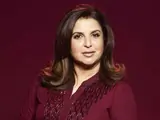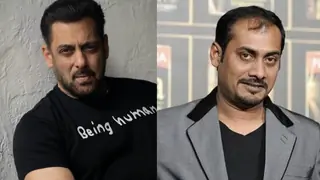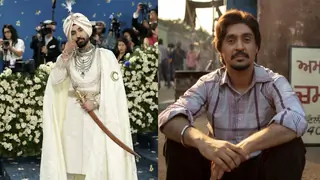| Farah, Formula Number One
DON'T MAKE me a tragic story, Farah Khan, 42, warns at the end of a long conversation in her plush sea-facing apartment in Versova, Mumbai. The etting sun bleached by an expanse of darkened windows is burning a path of white gold across the still water. The bounce of its last light has recast the city's dreary skyline in a platinum glow. The world is full of shimmering possibility. It's difficult to imagine anything tragic about the brisk, cheerful woman lying in this setting, tracing the contours of a large belly. Khan is expecting triplets in February and her film Om Shanti Om has been declared a super superhit. (Most films in Bollywood are declared that — usually by the makers themselves — so that's not much of a big thing. What is a big thing though is that the film has been raking in hosannas from the most unexpected quarters. And the smiles it has generated are still radiating.) Still, like the mega-masala films of the 70s she adores, Khan's life has a little dose of everything: poverty, sorrow, tragedy, a beloved but troublesome sibling, inter-community love, hard work, comedy, and finally, formula success. In a curious twist, Khan is the very epitome of the masala plots she loves: she is not a tragic story though because she would never script one. Khan was born into a film family. Her father Kamran Khan was a producer of successful B and C grade films — "the Samson and Delilah type" — and until Khan was eight, the family had swank cars and plenty of homes. Khan's mother similarly came from a film family — her sisters were the child artists Honey and Daisy Irani. Khan herself seemed to have breathed cinema in the womb: she was born a prodigy of song and dance. "When Farah was about two, we used to ask her to pull out records for us," says her mother Menaka. "It was the kind of thing one would do to show off in front of guests. We'd say, find Roop Tera Mastana, and she'd find the song amongst all the hundreds of records." And she would dance — actor Sanjiv Kumar was among the many who were mesmerised by the child. "When she was about six or seven, the film Hare Krishna Hare Rama had come out," continues her mother. "That Diwali, I saw Farah dance at a building function on the terrace — I couldn't believe she was my daughter." "We watched movies every day of our lives," says Khan's younger brother, Sajid. "Till today, we might miss each other's birthdays, but we always get together in front of the TV to watch the Oscars. We've never missed a single one." But family idylls are usually shortlived in Hindi cinema. In 1973, the inevitable happened. Kamran Khan tripped in the casino of life: he made a film that was a colossal disaster. The failures began to cascade after that. The money disappeared, the houses disappeared, the cars disappeared. True to the ironies of Bollywood, the film was called Aisa Bhi Hota Hai. "The reason I'm so grounded," says Khan, "is that I've seen it all. One day everyone is at your party, drinking and celebrating, and then the film flops, and the next day there's no one there."Except the steadfast companion: cinema. As the Khans' world shrank, the siblings took refuge in films. Their father had withdrawn into drink — he wouldn't recover till he died 14 years later — and their mother was forced to leave with the children, live separately in a 200 square feet adjunct in her relative's house, and find a job as a housekeeper at Sea Rock Hotel. But neither sibling exposes a trace of self-pity. "It wasn't his fault. It just happened," says Khan with characteristic hardiness, "I feel as if I'm betraying my father if we talk about all this."Life was a scrape those years. Young Sajid bivouacked into self-confessed delinquency and some sessions with a psychiatrist. "I was desperate to get rich," he says. "I was always scamming people, making plans to rob. I could have landed up in jail." Khan, on the other hand, to use her brother's words, was "God's child". He went to the posh school, she to the neighbourhood convent. But while he was out robbing, she was out working — at whatever she could lay her hands on: colony surveys, tuitions, teaching Mithun Chakravarty's son Michael Jackson dance steps. One time, she won a dance competition prize to Mauritius but she had the ticket converted to money to help her mother keep the household going.Talk to the siblings though and all of this is a minor strain: the truth as they would have you have it is that their childhood was a bedazzlement of laughter and forgetting in which cinema reigned supreme. Prakash Mehra, Manmohan Desai, Nasser Hussain, Rajesh Khanna, Amitabh Bachchan, Michael Jackson, Fred Astaire, Gene Kelley, Tarzan 303. And most significantly, according to Sajid, a CD of ham scenes their aunts had. "We loved that stuff," he says — dire straits be damned. Fit kids for a mother who loved movies so much she went to see the first-day first-show of Beti before driving to the hospital to deliver her son. Intermission. THE TURNING point in Farah Khan's life — aptly enough — was the film Jo Jeeta Wohi Sikandar. Taken on as assistant director by Nasser Hussain, she suddenly found herself asked to play choreographer when her predecessor, Saroj Khan stomped out. She crafted the song Pehla Nasha. It was the birth of a new aesthetic. Since then, Khan has choreographed almost a 100 films. Untrained, fed only by intuition, she changed all the rules. Gone were the squeamish, selfashamed bodies, the vulgar suggestions, the undulations of rolling fat. 1942, A Love Story. Dil Se. Kuch Kuch Hota Hai. Dilwale Dulhania Le Jayenge. Dil Chahta Hai. Monsoon Wedding: almost single-handedly, Khan made Bollywood dancing cool, clubby, hip, international. Yet, unmistakably Indian. "I also raised the pay," says Khan, "I don't get enough credit for that. When I started, dancers were paid Rs 250 a day. I pushed it to Rs 1,000 very quickly. Now it ranges from Rs 5,000 to 10,000 a day." "Her dancers call her Mama," says her brother. Slowly, the money, the houses, the cars returned. But Khan remained unimpressed. She understands the casino. Ask people about her, and a roll-call of traits flow out: very funny, very blunt, very honest, very transparent, very no-nonsense. Very solid. All of this — life, love of cinema, her gift for laughter — has coalesced in Khan's blockbuster Om Shanti Om — a hilarious, affectionate, genre-bending film that takes he piss out of every traditional Hindi cinema trope, evenwhile lovingly continuing to live inside the genre. It jokes at the industry and jokes at itself. Intelligently leavened with irony and affection — and completely over-the-top — it does what Khan's first film Main Hoon Na could not do: it nudges an intimate elbow at everyone's shared memory and evokes the self-deprecating but overwhelming love people have for the larger-than-life cinema of the 70s. "I thought it was brilliant," says Shimit Amin, director of Chak De, a film as far as it can get from OSO. "Farah is like a pop culture historian. OSO is an endearment that laughs at the 70s but captures the heart and soul and conviction those films had in themselves." "I loved it," chuckles Anurag Kashyap, another director one would expect to be cantankerous about such a film. "It was like a guilty pleasure. This is totally against my notion of cinema, but I found myself laughing right through it. It is so intelligent, so self-aware. People will kill me if I admit this on my blog, Passion For Cinema, but no one who loves cinema can help but love this film."Which brings one to the curtain call — the credits: the S-factors in Khan's life: Sajid — soulmate-brother, Shirish — soulmatehusband, Shah Rukh — soulmate-friend-umbilical cord. Can Khan's creativity stretch beyond these three? She's not answering. Right now, having followed the plot correctly and married a Hindu man, she is focusing on her triplets. They are to be named Amar, Akbar and Anthony. Unless, in a last-minute, self-aware change of plan, three little girls are born instead. Each like their mother, ready to fight big battles in a man's world. | ||
| From Tehelka Magazine, Vol 4, Issue 47, Dated Dec 08 , 2007 |





















30